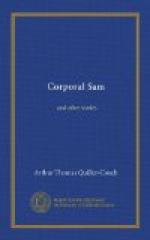The lad, in fact, was sick of fighting and slaughter—physically ill at the remembrance and thought of them. The rage of the assault had burnt its way through him like a fever and left him weak, giddy, queasy of stomach. He had always hated the sight of suffering, even the suffering of dumb animals: and as a sportsman, home in England, he had learnt to kill his game clean, were it beast or bird. In thought, he had always loathed the trade of a butcher, and had certainly never guessed that soldiering could be—as here in San Sebastian he had seen it—more bestial than the shambles.
For some reason, as he picked his road, his mind wandered away from the reek and stink of San Sebastian and back to England, back to Somerset, to the slopes of Mendip. His home there had overlooked an ancient battle-field, and as a boy, tending the sheep on the uplands, he had conned it often and curiously, having heard the old men tell tales of it. The battle had been fought on a wide plain intersected by many water-dykes. Twice or thrice he had taken a holiday to explore it, half expecting that a close view would tell him something of its history; but, having no books to help him, he had brought back very little beyond a sense of awe that so tremendous a thing had happened just there, and (unconsciously) a stored remembrance of the scents blown across the level from the flowers that lined the dykes— scents of mint and meadow-sweet at home there, as the hawthorn was at home on the hills above.
He smelt them now, across the reek of San Sebastian, and they wafted him back to England—to boyhood, dreaming of war but innocent of its crimes—to long thoughts, long summer days spent among the unheeding sheep, his dog Rover beside him—an almost thoroughbred collie, and a good dog, too, though his end had been tragic. . . . But why on earth should his thoughts be running on Rover just now?
Yet, and although, as he went, England was nearer to him and more real than the smoking heaps between which he picked his way, he steered all the while towards the upper town, through the square, and up the hill overlooked by the convent and the rocky base of the citadel. He knew the exact position of the house, and he chose a narrow street—uninhabited now, and devastated by fire—that led directly to it.
The house was untouched by fire as yet, though another to the left of it blazed furiously. It clung, as it were a swallow’s nest, to the face of the cliff. A garden wall ran under the front; and, parallel with the wall, a road pretty constantly swept by musketry fire from the convent. At the head of the street Corporal Sam stumbled against a rifleman who, sheltered from bullets at the angle of the crossing, stood calmly watching the conflagration.
‘Hallo!’ said the rifleman cheerfully; ’I wanted some more audience, and you’re just in time.’
‘There’s a child in the house, eh?’ panted Corporal Sam, who had come up the street at a run.




